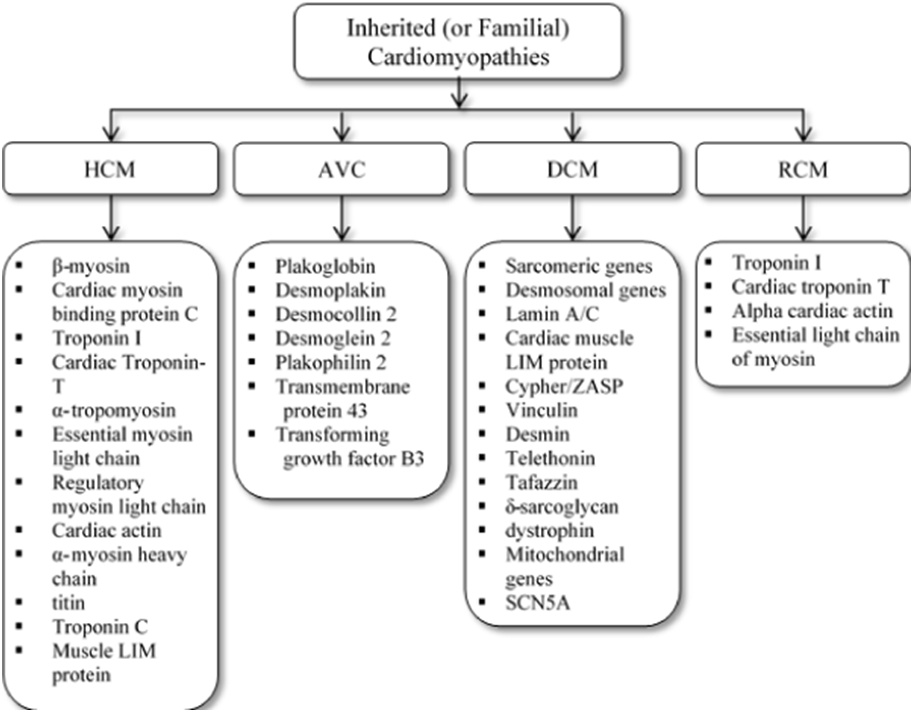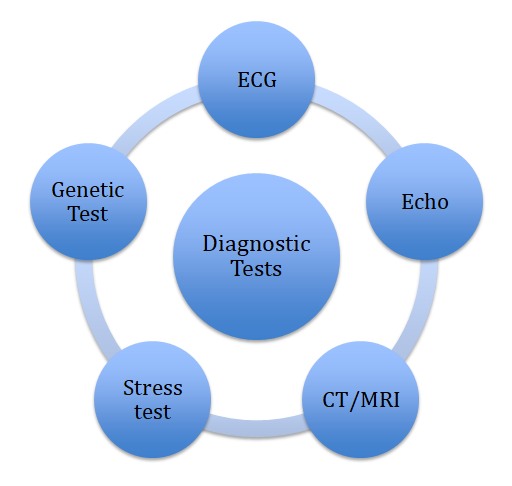Inherited Heart Diseases are a group of heart diseases caused by genetic abnormalities that run in families and often go unnoticed until someone develops unexplained heart failure, life-threatening arrhythmias or sudden cardiac death. The prevalence of inherited heart diseases ranges from 1 in 200 to 10000 in the general population. Unraveling the mysteries in our genetic code that have been implicated in young sudden deaths has been the focus of the multidisciplinary cardio-genetic teams that have been established across the globe in the recent past.
The Genomic Revolution
With the sequencing of the human genome at the turn of the 21st century arrived the era of human genomics, which has revolutionized the clinical application of the genetic testing modality. What was until then a research tool confined to the laboratory was catapulted to the clinic and the forefront of disease management as a diagnostic, prognostic and therapeutic tool. The advances in human genetics have aided in successfully identifying the causative genes for a range of cardiac disorders, particularly inherited heart diseases or inherited cardiac conditions (1).
The double-stranded human genome of each cell contains 6.4 billion nucleotides. The approach to identifying the causal genes and variants of heart diseases has evolved dramatically over the past 3 decades. The conventional approach of genetic linkage analysis in large families, which was very successful in linking causal DNA mutations to rare single gene disorders, has all but been replaced with the newer approaches of next-generation DNA sequencing (NGS) in small families and individual cases and genome-wide association studies (GWAS) in large populations. The newer approaches have not only expanded the applicability of the genetic tool in everyday patient care but have also become much more affordable for the common man.
Inherited Heart Disease and Sudden Cardiac Death (SCD)
Among the different types of heart diseases like coronary heart disease, congenital heart disease, valvular heart disease and inherited heart disease, the last group contributes to the largest proportion of sudden cardiac death in apparently healthy individuals below the age of 45 years. Cardiomyopathies and channelopathies are the two major types of inherited heart diseases of which a wealth of causative genetic information has become available since the first hypertrophic cardiomyopathy gene MYH7 was discovered in 1989 (2).
Inherited cardiomyopathies, where the affected individuals have structural and functional abnormalities of the heart due to an underlying gene mutation, are estimated to affect up to 1 in 500 individuals. The following are the genes implicated in the 4 main types of cardiomyopathies.
- Hypertrophic cardiomyopathy (HCM)
- Arrhythmogenic ventricular cardiomyopathy (AVC)
- Dilated cardiomyopathy (DCM)
- Restrictive cardiomyopathy (RCM)

Channelopathies or inherited arrhythmias, where individuals with a structurally normal heart have an abnormal heart rhythm due to an underlying gene mutation, are the leading cause of sudden arrhythmic death syndrome (SADS). The diseases in this group are:
- Long QT syndrome (LQTS)
- Brugada syndrome
- Catecholaminergic polymorphic ventricular tachycardia (CPVT)
- Progressive cardiac conduction defect (PCCD)
Other inherited conditions that can affect the heart are:
- Familial hypercholesterolemia (FH)
- Marfan Syndrome
- Congenital heart disease
- Premature atherosclerosis
Manifestations of inherited heart disease
A wide range of symptoms, from an absence of symptoms to fatal cardiac events, is known in individuals with inherited heart diseases. The following symptoms should alert the physician:
- Dizziness
- Palpitations
- Syncope
- Dyspnea
- Heart failure
- Arrhythmia
- Sudden death
As arrhythmias can be triggered by exercise, athletes are particularly prone to developing symptoms during or after training. Sports cardiology is the field of medicine that helps screen athletes for inherited conditions and manages them appropriately. The below diagram shows some common presentations in individuals with inherited arrhythmias or channelopathies.
Clinical presentation of inherited arrhythmias
Diagnosis of inherited heart disease
Inherited heart diseases often pose a diagnostic dilemma, even to the best of the clinical minds. Misdiagnosis and delayed diagnosis are extremely common. The first step in diagnosing an inherited heart disease is taking a detailed history of the patient’s symptoms. Understanding the family history thoroughly, especially eliciting a three-generational history gives a clear picture of the disease pattern in the family members. The following tests are then performed to throw light on the electrical activity, structural pattern, and functional aspects of the heart.
The diagnostic tests used in Inherited heart disease patients

Role of genetic testing
Genetic testing is the process of taking a sample of a person’s DNA to look for changes that could cause inherited heart disease. It is performed like a routine blood test but involves the comprehensive analysis and interpretation of the genetic data and provides valuable insights into the genetic abnormalities that are known to cause heart diseases. Cardiac genetic testing is best undertaken in a specialized multidisciplinary healthcare setting where specific clinical and genetic expertise is available (3).
Genetic testing can be used to:
- Clarify the diagnosis in a person who has, or is suspected to have, inherited heart disease
- Identify the cause of heart disease in a family
- Risk stratify the affected person based on the clinical presentation (phenotype) and the genetic information (genotype)
- Predict which family members are at risk to develop the family’s heart condition
- Provide options for family planning, including preimplantation genetic diagnosis to try to avoid passing a disease-causing mutation to offspring
The above tests are first performed on the proband (the first family member to show symptoms) and then on the family members to identify the affected individuals and treat them early to prevent life-threatening arrhythmias and sudden death.
The time taken for genetic test results to become available is around 4-6 weeks. Genetic counseling is provided before performing the genetic test and after the test results become available so that the tested persons understand the implications of the test and the results.
Treatment modalities for inherited heart disease
To manage inherited heart disease, one or more of the following modalities may be employed. The choice of treatment is based on the symptom profile and the risk of sudden death in the affected individual.
- Lifestyle changes, such as weight loss or exercise to help prevent or minimize the effects of heart disease
- Healthy living, like avoiding smoking, alcohol, caffeine and high-fat foods to improve general health
- Other lifestyle changes like avoiding competitive sports and certain kinds of activities if the patient is prone to arrhythmias
- A list of medications to be avoided as well as stringent fever management strategies will be provided for patients and families with channelopathies
- Medication such as beta-blockers, antiplatelets, antiarrhythmics and heart failure drugs may be used as applicable
- Cardiovascular surgery to repair or replace damaged valves/vessels, to perform septal reduction or cardiac denervation
- An implantable cardioverter-defibrillator (ICD), a device that automatically corrects arrhythmia, may be inserted when indicated
The establishment of multidisciplinary teams is vital to the systematic care and follow-up of families with inherited heart diseases. A host of healthcare professionals and support staff as shown in the figure below have to work in unison to achieve the common goal of preventing sudden death due to cardiac genetic abnormalities.
Specialists constituting an inherited heart disease clinic

References:
- Roberts R, Marian AJ, Dandona S, Stewart AF. Genomics in cardiovascular disease. J Am Coll Cardiol. 2013;61(20):2029-37
- Bezzina CR, Lahrouchi N, Priori SG. Genetics of Sudden Cardiac Death. Circ Res. 2015;116:1919-36
- European Heart Rhythm Association (EHRA)/Heart Rhythm Society (HRS)/Asia Pacific Heart Rhythm Society (APHRS)/Latin American Heart Rhythm Society (LAHRS) Expert Consensus Statement on the state of genetic testing for cardiac diseases. https://doi.org/10.1002/joa3.12717
 Dr. Priya Chockalingam
Dr. Priya Chockalingam
MBBS, MRCPCH, Ph.D.Cardiogenetics
Clinical Lead & Consultant Inherited Heart Diseases
Kauvery Hospital Chennai




